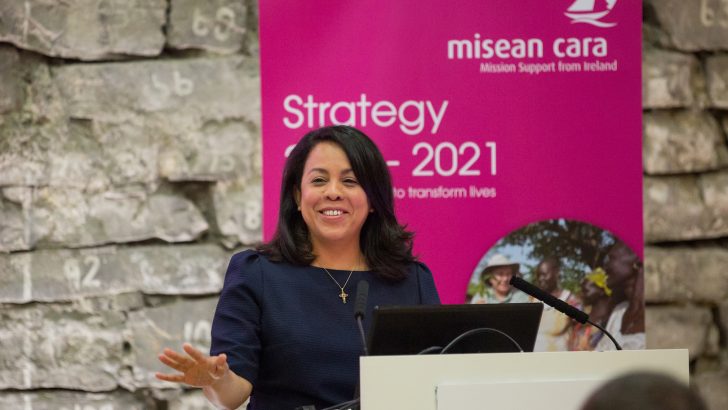For the first time faith-based organisations and missionary congregations have united to call on the Government to an increase Overseas Development Aid (ODA) in Budget 2018, which is due to be announced next week.
This coordinated effort has brought together the support of six of Ireland’s well-known faith-based organisations – CBM Ireland, Tearfund Ireland, Team Hope, Christian Aid, World Vision and Trócaire – and 77 Misean Cara member organisations, who have been lobbying the Taoiseach and the Department of Finance to put Ireland back on track to achieving the UN target of 0.7% of Gross National Income by 2025.
“In 2016 Ireland spent only 0.33% of the gross national income on ODA, this is down from a height of 0.59% in 2008. An increase in Irish ODA would reaffirm Ireland’s stance as a world leader in the fight against poverty, hunger and injustice,” says Heydi Foster, Misean Cara CEO.
Progress
“Tremendous progress has been made, but we have to do more. Right now some 2.6 billion people have gained access to drinking water since 1990 and primary school enrolment rates now stand at 91% worldwide, so we have made some gains. Now is the time to invest to end poverty.”
At a recent Fine Gael think-in, Taoiseach Leo Varadkar announced there would be an increase in ODA in the Budget, saying that “the problems of the world are our problems as well”.
Ms Foster has welcomed the announcement as “positive and encouraging”, but says it is still unclear what that increase will be.
The Government has repeatedly restated its strong commitment to Ireland’s overseas aid programme and its place at the heart of Ireland’s foreign policy, and she emphasises that an increase in Irish ODA would reaffirm Ireland’s stance as a world leader in the fight against poverty, hunger and injustice.
“There is so much happening right now and we don’t have sufficient funds to support all the work that our members are doing and the work that they want and need to do,” she says. “Our members are doing amazing work. If I could give you one example, the Good Shepherd Sisters are working with a mining company in Kolwezi in DR, Congo where children as young as three are working alongside their parents in horrendous conditions. The Good Shepherd Sisters are one of 15 Misean Cara members that have consultancy status at the United Nations Humans Rights Council and three years ago they issued a statement to the council about poverty and social exclusion in Kolwezi, and put it on the international agenda.”
When asked how she would address people who say that Ireland should look to its own citizens first, especially in the face of the homelessness crisis, Ms Foster says “it does not have to be one or the other”.
“The Irish know both parts of the story. They know what it is like to be displaced and to be refugees, and they have also supported those in need. We understand what it is like to lose everything. I think Ireland has such a legacy and we are known for our generosity. All our work in Misean Cara and our members is grounded in love of humanity, love of God and simple rights that the West often takes for granted.”
Misean Cara was established in 2004 and is made up of 90 member organisations working in over 50 countries collectively and individually through the missionary approach to development.
Last year 55 member organisations working in 45 countries in Africa, Latin America and Asia transformed the lives of over 1.4 million people through a series of development projects focused on education, health, sustainable livelihoods, human rights, and humanitarian emergencies.
This year Misean Cara launched an ambitious strategy for 2017-2021 after a massive global consultation in 10 countries with over 1,000 people participating.
Ms Foster says the new strategy has a heavy human rights focus. “The strategy is going to represent an ongoing commitment to education, health, sustainable livelihoods and human rights, we are going to continue to target marginalised communities, but we are going to have more of a focus on women and children, refugees and displaced people, and on people with disabilities,” she says.
“Our human rights focus is a thread through our five of our strategic goals. Now it is about upholding the rights to education, upholding the rights to clean water and sanitation, it is about upholding the rights to income generation. It is about rights for us. Of course it is also important to address climate change and this is connected with our continuing work on livelihoods and income generation.”
Another one of the goals of the new strategy is promoting the particular “missionary approach to development”.
What makes the missionary approach to development distinctive according to Ms Foster is its “long-term commitment”. “Our members walk hand-in-hand with beneficiaries. They rethink boundaries. They go beyond borders and see each individual as a brother or sister, as respected, rights-holding citizens of the world with equal inherent human dignity,” she says.
“The missionary approach to development also means ensuring participation of the marginalised. It is about empowering people as key actors in their own development, so they can use their voice and collective power at appropriate levels – local, national or international. It is also about influencing the policies and practices of governments and other development stakeholders.”
She says missionaries are often first responders, “not because they are just the first to arrive, they are already there, they are part of the community. They are often times there before, during and after a crisis or conflict.”
While Irish missionaries are ageing and their numbers are declining, Ms Foster says the movement is alive and flourishing.
“We don’t see ourselves as declining and we don’t see borders. For example the Good Shepherd Sisters have 21,000 members, how is that declining? We are a live, thriving, energetic and innovative missionary movement.”


 Mags Gargan
Mags Gargan Heydi Foster, CEO, Misean Cara
Heydi Foster, CEO, Misean Cara 